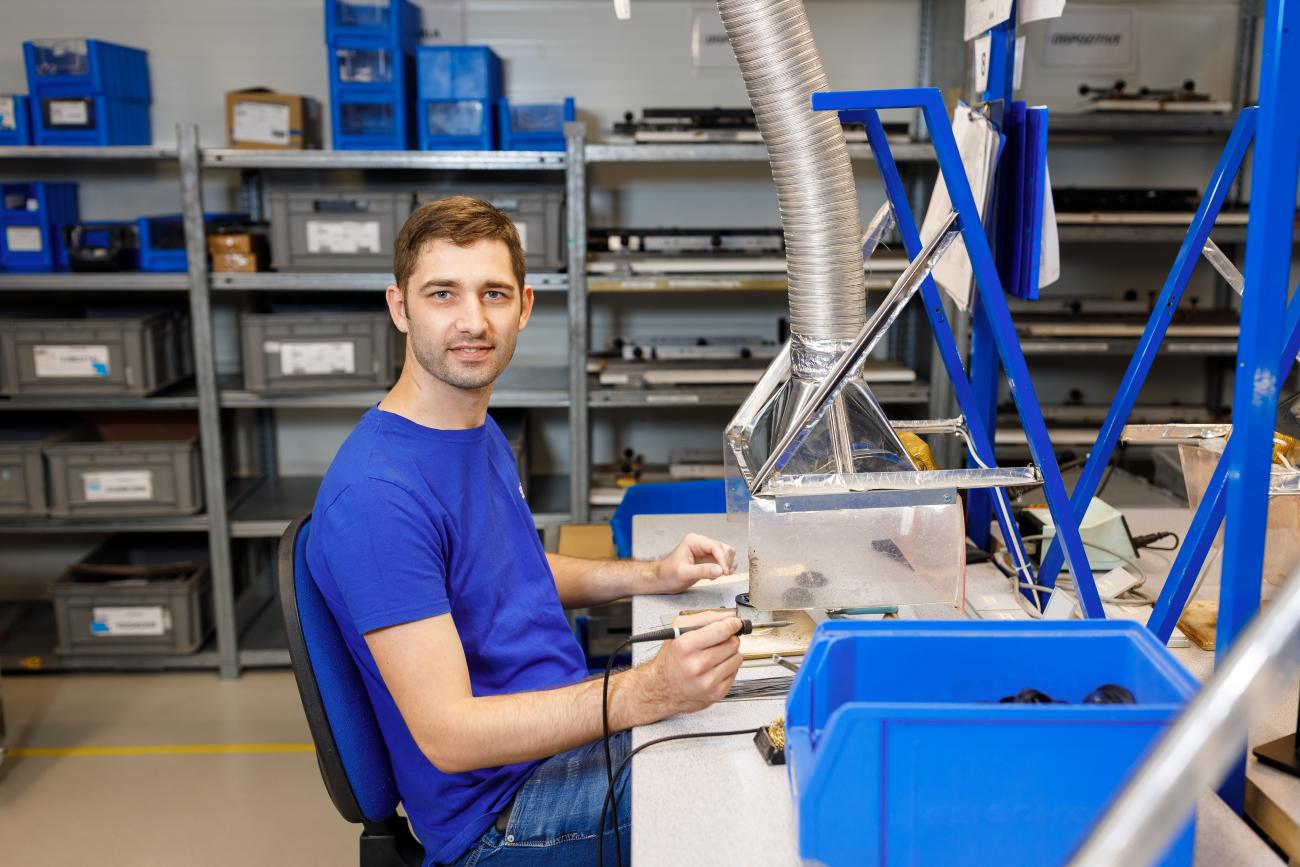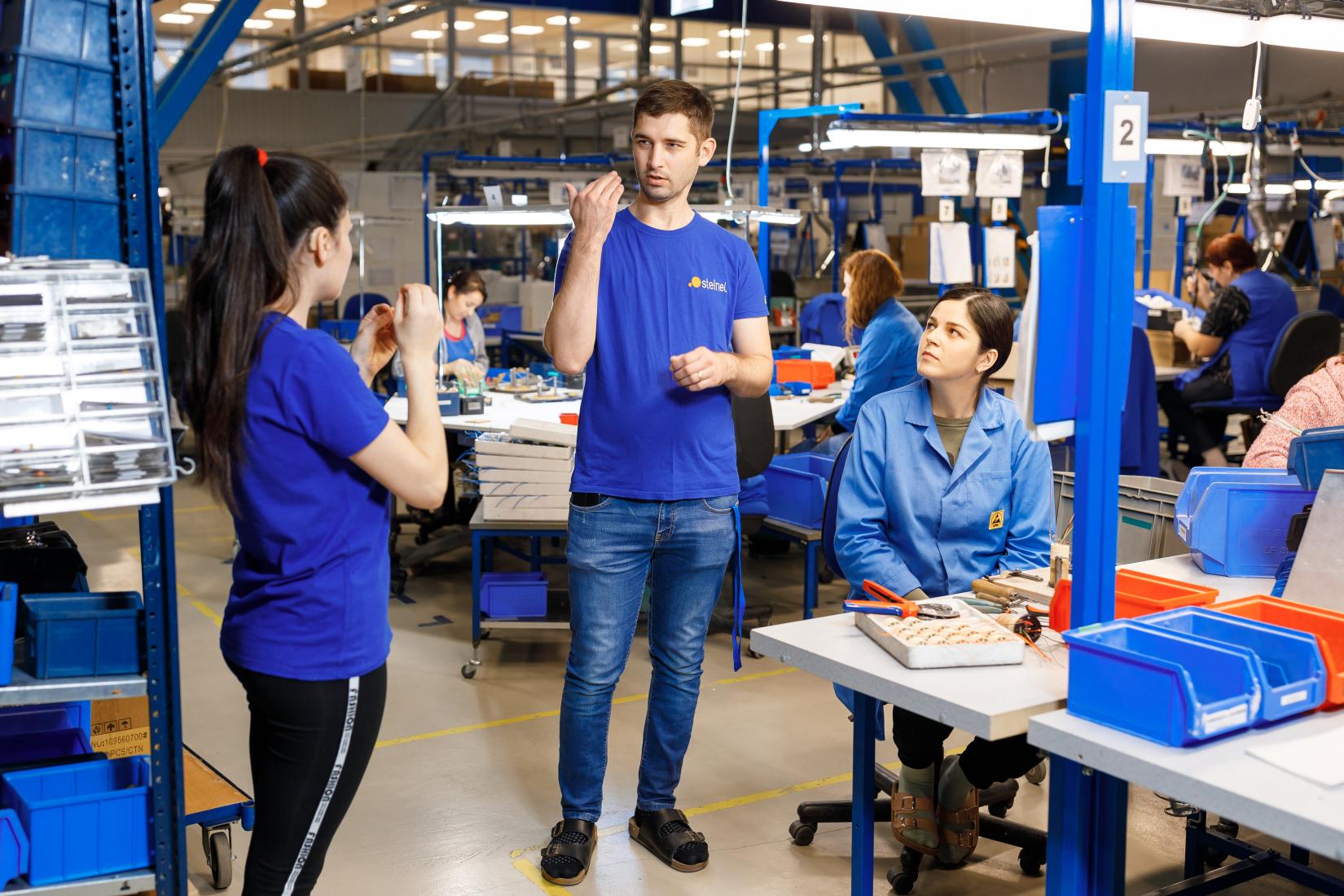Beyond silence - another success story of including people with disabilities in the Moldovan labour market

Read the story of Ion and Mariana, two deaf-mute workers in Chisinau, Moldova.
They found a good job they love because of a new wage subsidy scheme creating a job opportunity for them. The ILO provided the technical assistance for these reforms aiming at the labour market integration of people with disabilities in Moldova.
Ion Nederita lives in Chisinau, the capital of the Republic of Moldova. He was two years old when diagnosed with a profound hearing loss. This loss severely impeded his ability to learn speaking. He learned sign language and this became his entry point to communication and education. However, it did not help him to find a good job.
“After graduating from a special school for deaf pupils, I realized there were limited choices for further vocational education”, confesses Ion with the help of a sign language interpreter. “I picked up carpentry, but my dream was to learn electronics. Unfortunately, neither ordinary schools nor specialized colleges could help people like me”.
As a carpenter Ion could not find a stable job, no matter how hard he tried.
“Young people in Moldova find it difficult to get a good-quality job, but this is tremendously more difficult for those who can neither hear nor speak”, says Ion. “I opted for self-employment, not because I wanted but because there was no other choice.” Ion mostly worked informally, without any form of social security.
“While doing carpentry to support myself, I practiced electronics in my free time. The sense of satisfaction from creating something with my hands gives me joy. Electronics and carpentry have this in common. I thought of giving up my own-account work and searching for a wage job, but I could never overcome the fear of being rejected again.”
With the onset of COVID-19, Ion’s economic situation deteriorated. The demand for his services greatly decreased due to lockdowns and restricted mobility. He could hardly make ends meet which was bad as he had married Mariana just a year before. “I found myself responsible for the two of us”, Ion touches Mariana’s hand gently, a gesture that conveys more than a thousand words.
Mariana shares Ion’s world of silence. She was born deaf and lived for many years in Bender, the second largest city in Transnistria, a disputed region in the east of Moldova. “I went to a special school for deaf people too”, Mariana explains. “Given my drawing skills, I was encouraged to join an ordinary school in Bender. However, I could not use sign language to talk to my pears there. Pen and paper served as a substitute for nearly four years”.
Mariana managed to obtain a formal certification as a graphic artist. She also earned a diploma in physical education and sports, the only vocational program available for the hearing impaired in Bender.

“People like us need better access to labour market information and guidance” says Mariana, an assembly operator for electronic parts at Steinel
Yet the two diplomas did not help me find a good job in Transnistria. Drawings and occasional sports events helped me to scrape by financially. In 2017, I moved to Chisinau, seeking a stable job, which I could not find. People like us need better access to labour market information and guidance. Employers need greater awareness too. Once, an employer told me that his employees’ voices and ears were his company’s main assets for attracting customers. This was a blunt rejection of my job application.”
In 2020, the young couple learned about a new public employment program. Their friends told them that this program had helped many people with disabilities to find jobs. Ion was also excited to find out that there were companies with profiles in electronics that partnered with this program. The couple reached out to the National Employment Agency, and both landed jobs at Steinel Electronic in a matter of days.
Steinel Electronic opened its doors in Moldova in 2007 with a production factory of the German company, specialised in sensor systems. The factory is located in Chisinau and employs 320 workers. Of these, 27 are people with disabilities. 14 men and women with various degrees of disability were employed with the support of the National Employment Agency through a wage subsidy program funded by the ILO. Ion and Mariana were among them. The wage subsidy scheme compensates the employer for the extra costs of hiring people with disabilities and subsidizes their wages in the first six months of work. This subsidy is equal to 30 per cent of the average wage in Moldova. In return, the employer makes a commitment to maintain the worker in employment for at least 12 months.
“We first hired workers with disabilities many years ago to reinforce our culture of social responsibility, as well as to comply with a legally imposed quota”, recalls Clementina Saratean, head of Steinel human resources department. “Yet we quickly realized workers with disabilities can be equally skilful and punctual, and, what’s very important, they are extremely loyal. The turnover among workers with disabilities is the lowest in our company. We focus on workers ability rather than disability. This experience has taught us that these people don’t want pity and charity, just equal opportunity to earn their own way and live independently.”
“We focus on workers’ ability rather than disability” says the HR Manager of the hiring firm
From their first day at Steinel Electronic, Ion and Mariana received individual coaching. They were trained on occupational safety and health, as well as on environmental protection. Ion was eager to upgrade his welding and wire bonding skills. Now he is a member of the Steinel electronic equipment assembler team. “Wire technics bring small-size components together and endow them with new potential. This kind of work requires good manual dexterity. And it is fascinating”, Ion’s eyes are shining. ”I am comfortable with what I am doing here. I am glad Mariana likes her job too. This is her first ever employment contract. Our next dream is to upgrade our digital skills. We know we are up to it. Our income is stable now, so we decided to start a family. Our baby is coming in just a few months”. Ion and Mariana exchange quick glances. There is lot of love and trust in their eyes.
Moldova has the lowest employment rate in Central and Eastern Europe hardly exceeding 40 per cent. Yet the employment rate of people with disabilities is only half of that. Back in 2017, Moldova introduced a National Employment Strategy, followed by a new Employment Promotion Law. The ILO provided technical assistance to these reforms including the design of new active labour market programs for special target groups like Ion and Mariana. These programs include trainings, wage subsidies, or support for start-ups. Starting in 2019, the National Employment Agency piloted five different programs with financial support from the ILO, including the wage subsidy scheme in which Steinel Electronic participated for hiring Ion and Mariana and others.


